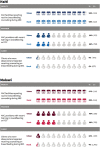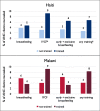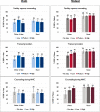Facility readiness and counseling during antenatal care and the relationship with early breastfeeding in Haiti and Malawi
- PMID: 32471370
- PMCID: PMC7257126
- DOI: 10.1186/s12884-020-02919-7
Facility readiness and counseling during antenatal care and the relationship with early breastfeeding in Haiti and Malawi
Abstract
Background: Early initiation of breastfeeding (within an hour of birth) has benefits for newborn health and survival. Optimal breastfeeding supports growth, health, and development. Health facilities provide essential pregnancy, maternal, and newborn care and offer support for early breastfeeding. We examined the relationship between the breastfeeding-related health service environment during antenatal care (ANC) and early initiation of breastfeeding.
Methods: Using data from recent Service Provision Assessment (SPA) surveys in Haiti and Malawi, we defined three indicators of the health service environment: availability of facilities with ANC services reporting routine breastfeeding counseling; provider training on breastfeeding; and breastfeeding counseling during ANC. We linked SPA data geographically to Demographic and Health Surveys (DHS) data from Haiti and Malawi. Multilevel, multivariable logistic regressions examined associations between the health service environment and early initiation of breastfeeding, controlling for women's background characteristics, with separate analyses for urban and rural residence.
Results: Over 95% of facilities in Haiti and Malawi reported routinely providing breastfeeding counseling during ANC. Only 40% of both urban and rural providers in Malawi and 29 and 26% of providers at urban and rural facilities in Haiti (respectively) received recent training in counseling on breastfeeding. Further, only 4-10% of clients received counseling. Breastfeeding counseling was generally more common among clients who attended ANC with a provider who had received recent training. After linking SPA and DHS data, our analysis showed that having more providers recently trained on breastfeeding was significantly associated with increased odds of early breastfeeding among women in urban areas of Haiti and Malawi. Additionally, women in urban areas of Malawi lived near facilities with more counseling during ANC were more likely to begin breastfeeding within an hour of birth compared with women in areas with less counseling.
Conclusions: Our study identified gaps in the health system's capacity to implement the recommended global guidelines in support of optimal breastfeeding practices. While breastfeeding counseling during ANC can promote early breastfeeding, counseling was not common. The study provides evidence that provider training could help improve counseling and support for early initiation of breastfeeding.
Keywords: Antenatal care; Breastfeeding counseling; Demographic and Health Survey (DHS); Early initiation of breastfeeding; Service Rrovision Assessment (SPA); Service readiness.
Conflict of interest statement
The authors declare that they have no competing interests.
Figures



Similar articles
-
Building an effective coverage cascade for antenatal care: linking of household survey and health facility assessment data in eight low- and middle-income countries.J Glob Health. 2025 Feb 14;15:04048. doi: 10.7189/jogh.15.04048. J Glob Health. 2025. PMID: 39950560 Free PMC article.
-
Limited Service Availability, Readiness, and Use of Facility-Based Delivery Care in Haiti: A Study Linking Health Facility Data and Population Data.Glob Health Sci Pract. 2017 Jun 27;5(2):244-260. doi: 10.9745/GHSP-D-16-00311. Print 2017 Jun 27. Glob Health Sci Pract. 2017. PMID: 28539502 Free PMC article.
-
Assessment of health facility capacity to provide newborn care in Bangladesh, Haiti, Malawi, Senegal, and Tanzania.J Glob Health. 2017 Dec;7(2):020509. doi: 10.7189/jogh.07.020509. J Glob Health. 2017. PMID: 29423186 Free PMC article.
-
Input, process, and output factors contributing to quality of antenatal care services: a scoping review of evidence.BMC Pregnancy Childbirth. 2022 Dec 28;22(1):977. doi: 10.1186/s12884-022-05331-5. BMC Pregnancy Childbirth. 2022. PMID: 36577961 Free PMC article.
-
Implementation of the new WHO antenatal care model for a positive pregnancy experience: a monitoring framework.BMJ Glob Health. 2020 Jun;5(6):e002605. doi: 10.1136/bmjgh-2020-002605. BMJ Glob Health. 2020. PMID: 32565442 Free PMC article. Review.
Cited by
-
Effect of Group Antenatal Care on Breastfeeding Knowledge and Practices Among Pregnant Women in Ghana: Findings from a Cluster-Randomized Controlled Trial.Int J Environ Res Public Health. 2024 Nov 28;21(12):1587. doi: 10.3390/ijerph21121587. Int J Environ Res Public Health. 2024. PMID: 39767428 Free PMC article. Clinical Trial.
-
Building an effective coverage cascade for antenatal care: linking of household survey and health facility assessment data in eight low- and middle-income countries.J Glob Health. 2025 Feb 14;15:04048. doi: 10.7189/jogh.15.04048. J Glob Health. 2025. PMID: 39950560 Free PMC article.
-
Innovative continuum of care to promote exclusive breast feeding in Pakistan: protocol of a pilot randomised controlled trial.BMJ Paediatr Open. 2024 May 20;8(1):e002562. doi: 10.1136/bmjpo-2024-002562. BMJ Paediatr Open. 2024. PMID: 38769049 Free PMC article.
-
Poor access to breastfeeding counseling services and associated factors among lactating mothers who had optimal antenatal care follow-up in Sub-saharan Africa: a multilevel analysis of the recent Demographic and Health Survey.BMC Health Serv Res. 2024 Dec 18;24(1):1577. doi: 10.1186/s12913-024-12064-y. BMC Health Serv Res. 2024. PMID: 39696253 Free PMC article.
-
Initiation of Breastfeeding in Low- and Middle-Income Countries: A Time-to-Event Analysis.Glob Health Sci Pract. 2021 Jun 30;9(2):308-317. doi: 10.9745/GHSP-D-20-00361. Print 2021 Jun 30. Glob Health Sci Pract. 2021. PMID: 34019481 Free PMC article.
References
-
- Rollins NC, Bhandari N, Hajeebhoy N, Horton S, Lutter CK, Martines JC, Piwoz EG, Richter LM, Victora CG. Why invest, and what it will take to improve breastfeeding practices? Lancet. 2016;387(10017):491–504. - PubMed
-
- Victora CG, Bahl R, Barros AJ, Franca GV, Horton S, Krasevec J, Murch S, Sankar MJ, Walker N, Rollins NC, et al. Breastfeeding in the 21st century: epidemiology, mechanisms, and lifelong effect. Lancet. 2016;387(10017):475–490. - PubMed
-
- WHO . Guideline: protecting, promoting and supporting breastfeeding in facilities providing maternity and newborn services. Geneva: World Health Organization; 2017. - PubMed
-
- Neovita Study Group Timing of initiation, patterns of breastfeeding, and infant survival: prospective analysis of pooled data from three randomised trials. Lancet Glob Health. 2016;4(4):e266–e275. - PubMed
MeSH terms
Grants and funding
LinkOut - more resources
Full Text Sources
Medical

